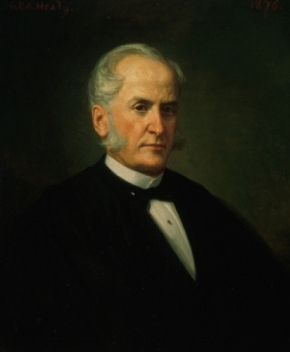You are here
Circuit Court Opinions:
Associate Justice Ward Hunt, United States v. Union Pacific Railroad Co. (1873)

United States v. Union Pacific Railroad Co., 28 F. Cas. 333 (C.C.D. Conn. 1873) (No. 16,598) [Second Circuit], affirmed, 98 U.S. 569 (1879)
The Union Pacific case was one of several lawsuits arising from the Crédit Mobilier scandal of the late 1860s and early 1870s. In 1867, a group of directors of the Union Pacific Railroad established the Crédit Mobilier Company, to which they then awarded building contracts. The contracts were overly favorable to Crédit Mobilier, draining money from the railroad and putting it into the pockets of the directors. In 1872, news broke that the directors were distributing Crédit Mobilier stock to influential politicians, including members of President Ulysses S. Grant’s administration. This revelation turned Crédit Mobilier into a serious national scandal.
In addition to land grants, the federal government was loaning railroads huge sums of money to help finance the construction boom that had resulted in the completion of the first transcontinental railway (built by the Union Pacific and Central Pacific Railroads) in 1869. When the scandal broke, many feared that the financial damage suffered by the Union Pacific would render it unable to pay back its government loans. In response, Congress enacted the Crédit Mobilier Act of 1873. Section 4 of the act permitted the attorney general of the United States to sue any company or individual that had misdirected or misused Union Pacific Railroad funds.
Following passage of the act, Attorney General George H. Williams brought a section 4 suit in the U.S. Circuit Court for the District of Connecticut against the Union Pacific, the Crédit Mobilier Company, the Wyoming Coal Company, and a long list of individuals. Justice Hunt presided over the case alongside U.S. District Judge Nathaniel Shipman. In an opinion written by Hunt, they dismissed the suit on the grounds that the United States could not sue to recover money owed to a corporation.
The statute granting a cause of action to the government was “valueless,” wrote Hunt. “The United States cannot convert to itself the property of another, by its own declaration, or its own authority; nor can it maintain an action, in its own name, against A. to recover a debt which he may owe to B.” To allow such a suit to go forward would be to deprive the railroad of its property without due process of law, he concluded. Any cause of action based on the misuse of Union Pacific funds could belong only to the railroad or its shareholders. In 1877, the Supreme Court affirmed the decision on similar grounds in what was known as the Crédit Mobilier Case.
